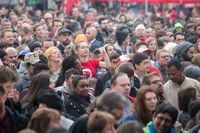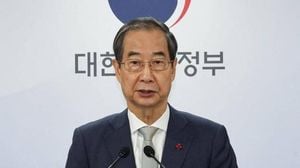On May 1, 2025, the celebration of Labor Day, known as the Día Internacional de los Trabajadores in Spain, highlights both the achievements and ongoing struggles of workers across Europe. While many view this day as a time for relaxation and family, it also serves as a platform for unions and political parties to demand better working conditions, fair wages, and more employment opportunities.
In Spain, approximately 2.8 million job seekers are currently unable to find employment, with many lacking access to unemployment benefits. The country’s largest unions, CCOO and UGT, are calling for demonstrations to push the new Spanish government for improved contracts and better working conditions. As CCOO stated, "We need to make our voices heard in demanding dignity and respect for workers." This sentiment reflects the broader European context, where Labor Day is celebrated in nearly all EU countries, except for the Netherlands.
Historically, May 1 has roots in the late 19th-century labor movement, particularly the introduction of the eight-hour workday. The American Federation of Labor initiated the first May Day demonstrations in the United States in 1888, aiming to advocate for this critical labor reform. The movement eventually spread to Europe, where it became a day of solidarity among workers.
In Spain, Labor Day is not only a national holiday but also a day of protest. Many Spaniards, however, opt to enjoy their day off with family rather than participate in demonstrations. This year, May 1 falls on a Thursday, coinciding with the 'puente de mayo,' allowing for an extended weekend for many. As a result, some families might prioritize leisure over activism.
In contrast, the situation in the Netherlands is quite different. Here, Labor Day is only an official holiday on the BES islands, and traditional celebrations have diminished over the years. The last major demonstrations organized by the CPN (Communist Party of the Netherlands) occurred in the 1980s. Today, while some civil servants and bank employees enjoy the day off, most workers do not. The day is largely symbolic, representing international solidarity among workers.
On the political front, various parties across Europe leverage Labor Day to present their social agendas. In Belgium, for instance, the PVDA (Workers' Party of Belgium) chairman Raoul Hedebouw emphasized that actions will continue until the government listens to workers' concerns. He stated, "1 May is a day of struggle, and we will not stop until our voices are heard." Hedebouw's remarks underscore the ongoing tensions between labor and government policies, particularly regarding pension reforms.
The N-VA (New Flemish Alliance) has also made its presence felt on Labor Day. Its chairman, Valerie Van Peel, called for cooperation among political parties and unions, acknowledging the challenges posed by the current savings policy. "Governments must make difficult decisions, and I understand the concerns of those affected," she said, appealing for unity rather than division.
Meanwhile, Vooruit (Forward) chairman Conner Rousseau is set to address militants in Sint-Niklaas, reinforcing the party's commitment to social justice. His party has been vocal about the need for a capital gains tax, with support from the PS (Francophone Socialist Party). PS chairman Paul Magnette echoed Rousseau's sentiments, declaring that working until the age of 67 is unrealistic for many workers. Magnette warned that if the government does not change its course, it could lead to a catastrophe for the working class.
Vlaams Belang, led by Tom Van Grieken, has taken a different stance, advocating for the separation of social security systems and positioning itself as the sole representative of the hardworking Flemish. Van Grieken criticized the current government for failing to deliver on its promises, stating, "Instead of real change, we see the status quo continue." His remarks reflect a growing frustration among some voters who feel left behind by mainstream parties.
In the realm of labor rights, Solidaris, a socialist health insurance fund, has called for reforms to address issues of fraud and abuse within the healthcare system. Its leader, Paul Callewaert, argued that instead of increasing patient fees, the focus should be on regulating healthcare providers. This call for reform highlights the intersection of labor rights and social justice, emphasizing the need for accountability in all sectors.
As the day progresses, speeches and rallies continue across Belgium, with various leaders addressing their supporters. The ABVV (General Belgian Trade Union) has also criticized the government's pension reforms, arguing that they disproportionately affect the most vulnerable workers. ABVV secretary Bert Engelaar stated, "These reforms are not about improving conditions; they are about punishing the working class." He called for a progressive wealth tax to ensure that the burden of economic recovery does not fall solely on the shoulders of workers.
Rousseau, in his address, reiterated the importance of investing in social services and security, asserting that the government must prioritize the needs of its citizens over military spending. He stated, "We need investments that genuinely protect and strengthen our communities, not just military hardware." This perspective resonates with many who feel that social welfare should be a priority in policy discussions.
As Labor Day unfolds across Europe, the messages of unity, struggle, and the fight for workers' rights resonate deeply within the hearts of many. While some may choose to spend the day relaxing, others will take to the streets to demand change and justice for the working class. The ongoing debates surrounding labor rights, pensions, and social security reform will undoubtedly shape the political landscape in the months to come.
In summary, May 1 serves as a reminder of both the progress made and the challenges that remain in the fight for workers' rights. As unions and political leaders rally their supporters, the call for solidarity and action continues to echo across the continent, highlighting the enduring spirit of the labor movement.





